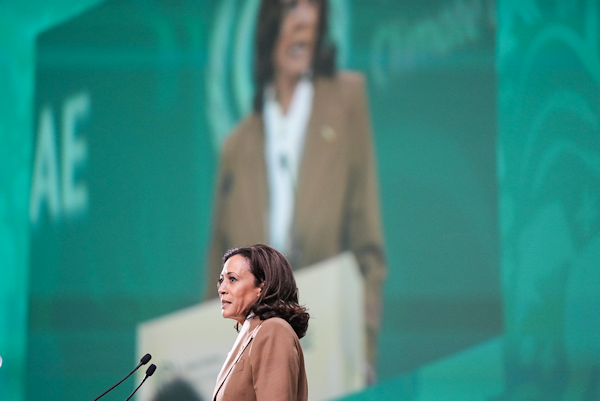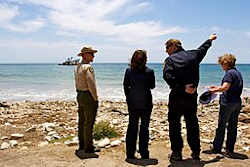SEJournal Online is the digital news magazine of the Society of Environmental Journalists. Learn more about SEJournal Online, including submission, subscription and advertising information.
 |
 |
| Vice President Kamala Harris addresses the COP28 conference in Dubai in December 2023, where her statement left little doubt she is a strong leader for climate action. Photo: Kamala Harris via @VP on X. |
Issue Backgrounder: Does Kamala Harris Have a Green Streak?
By Joseph A. Davis
 |
What would a Kamala Harris presidency mean for the environment?
A lot depends on what other changes the coming election might bring to the House and Senate — and even the statehouses. Divided government is a possibility. That clouds the crystal ball.
But a Harris presidency would likely continue many of the environmental policies of the Biden administration, and just as likely face many of the same obstacles and opponents.
Harris herself has been a bit vague about her prospective environmental and energy policies to date. That may be intentional. Specific policies would inspire specific opposition from big lobbies.
Of course, since she declared her candidacy in July, there has not been much time to develop a detailed platform. She has said enough, however, to give a clear idea of her direction.
Harris has not had to struggle to
win support from the progressive
young climate activists who
ultimately put Biden over the top.
Certainly, unlike President Joe Biden, Harris has not had to struggle to win support from the progressive young climate activists who ultimately put Biden over the top.
Most environmental groups endorsed her very quickly and some major climate and environmental groups in August announced a $55 million ad campaign to support her election.
Telling, however, is the stance of the Sunrise Movement, the progressive youth climate group that pushed for the “Green New Deal.” It is expanding its phone banking, door knocking and digital ad campaigns for Harris — but it is withholding their formal endorsement until she reveals more of her climate agenda. And recently, two climate activists were arrested (may require subscription) outside her California home at the end of a Sunrise Movement protest.
Green New Deal and fracking
Harris, remember, was one of 11 original cosponsors of Sen. Ed Markey’s Green New Deal resolution in the Senate. That resolution had no practical effect, but was rather a far-reaching statement about what U.S. climate policy should be. It was never adopted by the Senate.
 |
| Harris in 2015, second from left, touring an oil spill cleanup site at Refugio State Beach near Santa Barbara while attorney general of California. Photo: Office of Attorney General Kamala Harris (Public Domain). |
Harris signed onto the Green New Deal in 2018, before she joined the Biden administration. Still, that stance might offer a clue about her inclinations before they were constrained by the Biden presidency.
Despite the hesitation of the Sunrise Movement, Harris quickly won the endorsement of another group: the Green New Deal Network, which had never endorsed Biden.
The Green New Deal is not really (or realistically) an issue anymore — except to Republicans who want to use it against Harris.
Likewise fracking. Few remember that Harris actually sued the administration of then-President Barack Obama in 2016, when she was still California’s attorney general. Obama agencies wanted to authorize offshore fracking in the Santa Barbara Channel. Harris won an injunction that survives to this day.
Fracking is a hot potato issue in this election because … Pennsylvania. It’s a winnable and must-win swing state, and also already one of the biggest fracking states in the country.
During her short run in the previous Democratic presidential primary, Harris in 2019 explicitly opposed all fracking. But once she became part of Biden’s 2020 ticket, she went with the policies of the Biden administration. Even Biden once wanted to stop all drilling (including fracking) on public lands. But barrages of lawsuits and political trade-offs eroded that position.
Harris herself, in her Aug. 29 CNN interview, said she would not oppose fracking, reversing any doubts about her earlier position.
The broadest of platforms
We will probably not get many further details about Harris’ environmental and energy platform before the election. Analysts think that’s a deliberate choice.
She mentioned climate only once (may require subscription) during her acceptance speech at the Democratic convention. It was barely mentioned in the Sept. 10 debate — and when it was, the discussion was really about energy.
Lisa Friedman wrote about that in an Aug. 21 New York Times piece (may require subscription), reporting that most mainstream environmental groups were OK with Harris’ climate policy vagueness. The green groups have little doubt that she will be a strong climate advocate.
Elsewhere, Friedman laid out Harris’ long record of climate action (may require subscription) and advocacy during her career. As noted before, most climate groups have endorsed her.
The Democrats’ platform, as adopted at the August convention, strongly supports climate action — action for “tackling the climate crisis, lowering energy costs, and securing energy independence.” In some detail. But it’s still a generic platform, drafted when Biden remained the candidate.
Her campaign finally put out a
longer platform document of its
own. But it added little detail on
climate and the environment.
Perhaps in response to criticism of Harris’ vagueness, her campaign finally put out a longer platform document of its own in September. But it added little detail on climate and the environment. It was just a paragraph of generalities promising to “lower energy costs and tackle the climate crisis.”
Compare and contrast
One of the best ways to consider Harris’ environmental platform is to compare hers with Trump’s. The former president, for instance, would once more pull the U.S. out of the Paris climate accord. Harris wouldn’t. The distinction is really that sharp.
It was Harris who represented the U.S. at the COP28 international climate meeting in Dubai. Her statement left little doubt that she is a strong leader for climate action. Globally.
Meanwhile, Trump rolled back some 100 environmental regulations while in office. The Biden-Harris administration spent four years restoring most of them. Trump, if elected, would roll them back again. Harris would not.
Harris’ emphasis on energy
during the debate surprised
some environmentalists.
Trump’s platform seems to be “drill, baby, drill.” But Harris’ emphasis on energy during the debate surprised some environmentalists, according to a story by Robin Bravender in E&E News. Perhaps anticipating Trump’s attacks with a Pennsylvania viewership in mind, she proudly boasted about how energy production had grown on the Biden-Harris watch.
To the environmentalists who had hoped for a stronger climate position from Harris, Lena Moffitt, executive director of Evergreen Action, was quoted by E&E as saying, “The most important thing we need to do for the climate is make sure we defeat Donald Trump, and I think Kamala Harris is running a damn good campaign.”
If Harris were to win, there would be none of the rule rollbacks expected from a Trump administration. She could, if she chose, ride with the Biden-era regulations already finalized or still in the pipeline.
Even without Democratic wins in the House and Senate, a Harris presidency would prevent GOP use of the Congressional Review Act to repeal regulations. She could veto any such moves.
Many of the most important Biden environmental regs still face years of litigation from industry. Four (or more) years of Harris could see that litigation to its end — with strong support from the Justice Department and federal agencies.
The iceberg that could sink such environmental litigation would still be Trump’s legacy Supreme Court, which has already signaled its determination to rein in agency power.
[Editor’s Note: Also see our recent Backgrounder on “What Would Trump 2.0 Mean for the Environment?” along with WatchDog Opinion columns, "What Would a Second Trump Reign Mean for Press Freedom?" and "Will Journalism Be a Crime in a Second Trump Administration?"]
Joseph A. Davis is a freelance writer/editor in Washington, D.C. who has been writing about the environment since 1976. He writes SEJournal Online's TipSheet, Reporter's Toolbox and Issue Backgrounder, and curates SEJ's weekday news headlines service EJToday and @EJTodayNews. Davis also directs SEJ's Freedom of Information Project and writes the WatchDog opinion column.
* From the weekly news magazine SEJournal Online, Vol. 9, No. 35. Content from each new issue of SEJournal Online is available to the public via the SEJournal Online main page. Subscribe to the e-newsletter here. And see past issues of the SEJournal archived here.













 Advertisement
Advertisement 



